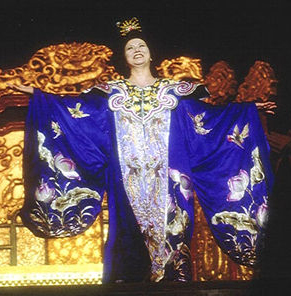China Remembered: Turandot at the Forbidden City
 Aug. 21 – The hosting of Giacomo Puccini’s opera “Turandot” at the Forbidden City in Beijing in 1998 was a landmark occasion for both the city, and China. Although we weren’t to know it at the time, it laid the groundwork for the confidence and capabilities of China to host the Summer Olympics a decade later.
Aug. 21 – The hosting of Giacomo Puccini’s opera “Turandot” at the Forbidden City in Beijing in 1998 was a landmark occasion for both the city, and China. Although we weren’t to know it at the time, it laid the groundwork for the confidence and capabilities of China to host the Summer Olympics a decade later.
It hadn’t been the first opera in modern times to be staged in China, but it was certainly the most high profile and raised the bar of expectations for China to be able to deliver international, jet-setting standards by leaps and bounds. Holding it at the Forbidden City was also a coup – it was the biggest event to have taken place there since the wedding of the by then non-sovereign monarch of China, Puyi to Elizabeth Gobulo Wan Rong in 1924. Tickets for the Premiere, VIP opening performance of Turandot were also astronomic – a whopping US$1,800 a seat. Beijing had never seen such prices. Yet the event was fully sold out, and it became the “must attend” performance for the rich and wealthy for that year. Aircraft were chartered worldwide especially to bring socialites and their billionaire husbands to Beijing for just these shows.
Turandot as an opera was chosen due to its subject matter – it is set in Peking, and centers around the story of a beautiful Chinese Princess, Turandot. Any man who wishes to marry her must answer three riddles. Based upon an ancient Persian story, the opera originally had its premiere at La Scala, Milan, in 1926, although Puccini sadly was not to see it – he had died of cancer a year earlier.
The Forbidden City version also had a stellar cast – conducted by Zubin Mehta and then enfant terrible, Zhang Yimou, who directed the performance. Zhang was a gamble, some of his films had been banned by the Chinese censors, yet China had needed someone with considerable artistic experience to direct the huge Chinese cast and singers – many of them on loan from the People’s Liberation Army. It’s also ironic that back when the opera first appeared, the then Kuomingtang Chinese government had banned the opera as portraying China in a negative light.
Hosting Turandot, a previously banned piece, in the Forbidden City, with a Chinese director also known for his criticism of government, with the world’s top conductor and a glittering array of international stars in a performance to be filmed, was a huge gamble for the authorities. The production took five years to arrange, at a cost of some US$15 million to produce. Over 1,000 people were involved in staging the event, with 350 of them flown in especially from Florence. Giovanna Casolla sang the lead role of Turandot, tenor Sergej Larin as Calaf, Turandots love striken admirer, and soprano Barbara Fittoli as Liu, the slave girl. Nessum Dorma of course remains the most famous aria from the opera, which is why it is so popular as a piece in China today.
The impact on China was immediate. Eight performances were given, and suddenly, after decades of suspicion, censorship and rejection of Western culture, Beijing had truly opened its doors. With international businesses hiring executive boxes for their guests, it was a huge hit with the corporate world, and almost certainly laid the groundwork for Beijing obtaining the winning votes to host the 2008 Olympics when the IOC reconvened to decide upon the winning city a few years later.
Zhang Yimou went on to choreograph the opening and closing ceremonies for the 2008 Olympics, and is now revisiting Turandot this coming October 6 and 7 for a performance to be given at the Birds Nest as part of the celebrations of the 60th anniversary of the founding of the People’s Republic of China. The 1998 Forbidden City performance meanwhile was captured on film and is available on DVD.
Beijing went on to host several other large scale cultural events prior to the Olympics, The Three Tenors also sang at the Forbidden City in 2001, a spectacular version of Verdi’s Aida was held at the Workers Stadium in 2003, and even Jean Michel Jarre got into the act with a sound and light electronic performance in 2004. Yet for many, the staging of Turandot in 1998 was a turning point in China’s willingness to embrace the West. It was a moment of initially hesitant, yet liberal cultural exchange, coupled with the excitement of artistic freedom of expression in China that marked the entry point for China’s entry onto the world stage. It will be some time before such an event has the impact on China that Turandot at the Forbidden City had in 1998.
Chris Devonshire-Ellis is the founding partner of Dezan Shira & Associates and lived in China for 21 years. He is now based in Mumbai. This is one of a series of “China Remembered” articles we will run in China Briefing during August. They will appear every Friday .
.
Chris’s popular book, “The Story Of A China Practice,” detailing the establishment of both Dezan Shira & Associates and China Briefing from 17 years ago to the present is also available as a free download to all China Briefing subscribers. It can be accessed by clicking on the picture to the right.
- Previous Article Beijing Releases List of Major Corporate Polluters, Energy Consumers
- Next Article U.S. Commercial Service Releases China Business Guide









